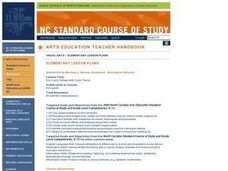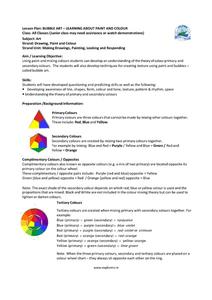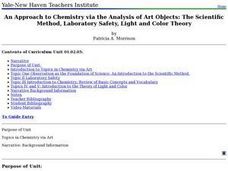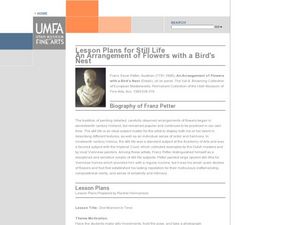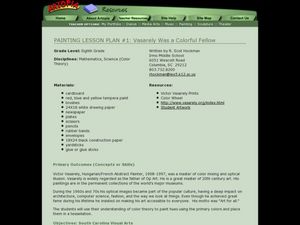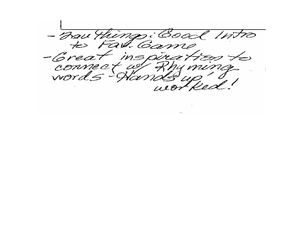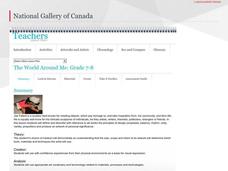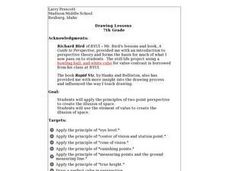Curated OER
da Vinci: Body Proportion Theories
Middle schoolers investigate the validity of da Vinci's proportion theory by recording human measurements on scatter plots. In groups of three, they record each other's height and wingspan to create a Powerpoint presentation, chart, or...
Curated OER
Color Theory & Using Layers
Students investigate the color wheel theory and incorporate it into simple sketches on their handheld. The importance of the use of layering and the difference between primary, secondary, and tertiary colors is presented in this lesson.
National Gallery of Canada
Mastering One-Point Perspective
Cover one-point perspective through observation and practice. Class members examine several works of art that use one-point perspective, look at magazine images to find the vanishing points and horizon lines, and draw their own city...
Curated OER
Eric Carle Collage with Color Theory
Second graders analyze color theory and collage techniques through the creation of collages in the style of artist/author Eric Carle. Color experiments and may hands-on section allow this lesson to be very informative and fun for the...
Marine Institute
Bubble Art – Learning About Paint and Color
To gain an understanding of color mixing theory and the color wheel, young artists draw a picture, mix up a batch of secondary colors to which they add dish soap, and using straws, bubble up the paint....
Curated OER
Lesson: Nikhil Chopra: Performing Memory
Film imitates life; that's what they say. Using performance theory to tie the lesson together, learners attempt to understand memory and daily rituals as seen in art, film, and life. They read two chapters from the book, watch the...
Curated OER
An Approach to Chemistry via the Analysis of Art Objects: The Scientific Method, Laboratory Safety, Light and Color Theory
Students create a painting that clearly exemplifies the use of primary pigments to make secondary pigments. They demonstrate the distinction between value and saturation. They explain the affect of adjacent colors on each other and...
Curated OER
Keys and Scales are Sets
Music theory lessons can be very tricky for some people. Children with a basic understanding of musical concepts take on the task of transposing music and identifying scale sets. This would be a good topic to address prior to discussing...
Curated OER
Music Theories
Explore the inception and evolution of hip-hop music as a springboard for writing music reviews and researching other genres of music. Learners will read and discuss the Times' article, From Underground Music to Fashion Statement to then...
National Gallery of Canada
The Changing Composition
Play with dimensions and practice making a two-dimensional scene look three-dimensional. Class members view pieces of art and then make their own scenes by layering different materials and drawing in details. Check out all the tabs for...
Curated OER
One Moment in Time
Students discuss the Mimetic theory and design a still life design in linoleum block. For this Mimetic theory lesson, students discuss the importance of realism in art and research Greek and Roman art forms from which the Mimetic...
Curated OER
Pitch, Intonation, Harmonic Theory
Students listen to pitches and determine if they are in tune, flat or sharp. Using Aurelia computer software and playing as a band, students practice pitch theory, and play two-octave major scales. They practice and discuss how to tune...
Curated OER
Vasarely Was A Colorful Fellow
Eighth graders create artwork inspired by the work of Victor Vasarely. For this op art lesson, 8th graders explore color theory and color mixing. Students create ten shapes to use in their artwork and over the course of two weeks,...
Curated OER
Nuclear Scientists Project
Young scholars explore nuclear scientists. In this nuclear science research lesson, students choose a scientist who has contributed to nuclear theory, research his/her life and accomplishments, and write a paper. Young scholars...
Curated OER
Classroom Builder
Students explore music theory by discussing a classic song. In this musical notation lesson plan, students listen to the song "My Favorite Things" and discuss and share their personal tastes with the class. Students practice writing...
California Department of Education
Consonance and Dissonance: Creating Intervals for Emotions (CTE)
How are music and emotion related? Using lesson plan two of four from the Changing One's Tune: A Music Therapy STEM Integrated Project Series, scholars explore the connection between the two topics. They learn to recognize different...
Education Closet
Equal Rhythms
Engage young mathematicians in learning about fractions with this cross-curricular math and music lesson. After listening to and repeating different beat patterns, children realize that musical notes are just another way of representing...
National Gallery of Canada
The World Around Me
Have your learners use their surroundings as inspiration for an art project. Class members first examine and discuss art. They then choose an area and spend five days taking down observations in written and sketch form. These...
National Gallery of Canada
Reading Sculptures
Consider the elements and principles of design closely while examining works of art. Learners select an image from the provided pieces to write about in relation to the elements and principles of design. They then sketch and sculpt their...
Curated OER
Drawing Lessons
Seventh graders complete a visual acts project that focuses on eye level, center of vision, station point, cone of vision, vanishing points, true height, and drawing a box in two point perspective. They work on a number of still life...
National Gallery of Canada
One Look Is Worth A Thousand Words
Facial expressions can communicate complex emotions. Examine expressions in several hyperrealistic works of art before beginning a project. Learners will create their own clay faces that show an emotion using either photos or their own...
Curated OER
Alternate Theory of Color Perception
Students use the color wheel, matches, masking tape, and slides to view an alternate theory of color perception. In this color perception lesson plan, students discuss the different theories and processors.
Curated OER
Color Theory Unit: Tint & Shade Strips
Students create three tint and three shade strips which depict a gradual gradation from color to white and from color to black.
Curated OER
Theoretical Quantum Physics... For Kids!
Learners explore quantum physics by participating in several class activities. In this space-time lesson, students discuss the concepts of time traveling and the anatomy of an atom. Learners draw geometric figures and utilize string to...
Other popular searches
- Math Number Theory
- Number Theory and Operations
- Number Theory 1
- Number Theory Rounding
- Number Theory Ed Helper
- Number Theory Ii
- Number Theory Edhelper
- Number Theory Concepts
- Number Theory Lesson Plans
- Math + Number Theory
- Egypt Math Number Theory
- Color Tiles Number Theory



